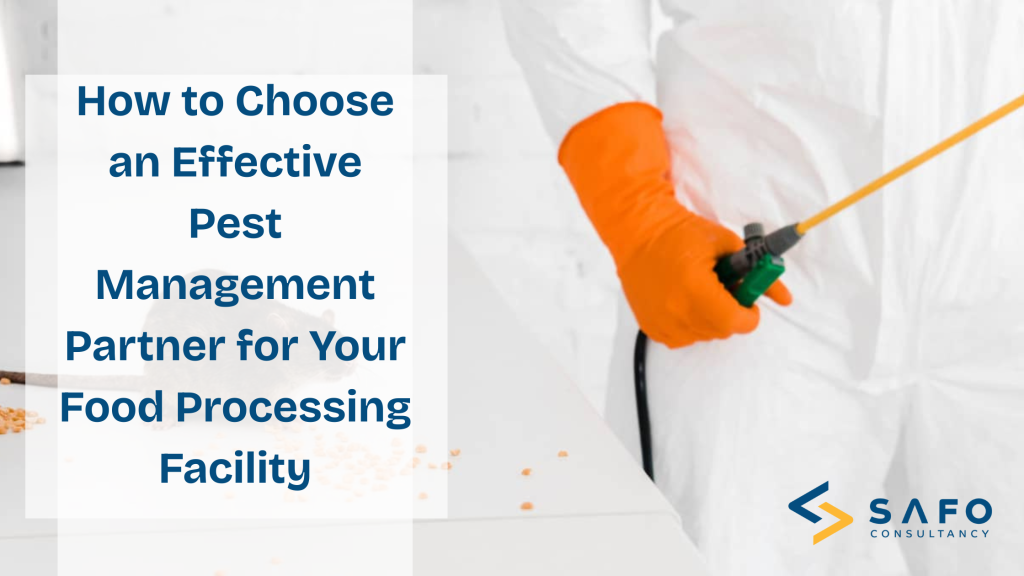
In the food processing industry, maintaining a pest-free environment isn’t just about cleanliness—it’s about protecting your brand, ensuring compliance with food safety standards, and most importantly, safeguarding public health. Choosing the right pest management partner is critical to achieving these goals. With numerous pest control companies out there, how do you select one that truly understands the unique needs of a food processing facility?
In this blog, we’ll walk you through the key factors to consider when selecting a reliable, experienced, and food safety-focused pest management partner.
Why Pest Control Is Critical in Food Processing Facilities
Pests such as rodents, cockroaches, flies, and stored product insects pose serious threats to food safety. They can:
-
Contaminate raw materials and finished products
-
Trigger costly food recalls
-
Damage machinery and infrastructure
-
Lead to regulatory non-compliance and legal penalties
-
Tarnish your reputation and consumer trust
For these reasons, partnering with a pest control provider that aligns with GMP, HACCP, ISO 22000, or BRCGS standards is not just advisable—it’s essential.
1. Look for Industry-Specific Experience
Not all pest control companies are created equal. A provider who specializes in residential or commercial services may not fully understand the rigorous requirements of food manufacturing environments. Ask:
-
Do they have experience in food or beverage processing plants?
-
Are they familiar with audit-ready pest control programs?
-
Can they provide references from other food businesses?
A company experienced in third-party audit compliance will know how to design pest control programs that withstand scrutiny from regulatory bodies and certification bodies.
2. Ensure Compliance with Food Safety Standards
A competent pest management partner should demonstrate knowledge of:
-
Good Manufacturing Practices (GMPs)
-
Hazard Analysis and Critical Control Points (HACCP)
-
ISO 22000 and FSSC 22000 requirements
-
BRCGS Food Safety Standard
They must offer documented procedures, logs, and pest activity trend reports that can be presented during audits.
Pro tip: Ask for examples of pest sighting logs, service reports, and corrective actions they provide to clients.
3. Evaluate Their Integrated Pest Management (IPM) Approach
Effective pest control in food processing requires more than just spraying chemicals. Look for a provider that offers an Integrated Pest Management (IPM) strategy. A good IPM plan includes:
-
Inspection and monitoring
-
Sanitation and structural recommendations
-
Non-chemical control methods
-
Judicious use of approved pesticides
-
Ongoing evaluation and improvement
This approach aligns with food safety requirements and reduces chemical residues in sensitive environments.
4. Verify Licenses, Certifications, and Training
Make sure your pest control partner holds:
-
Valid pest control licenses from relevant authorities
-
Certifications like CEPA Certified, NPMA membership, or ISO certifications
-
Staff trained in food safety, pest biology, and safe pesticide application
Ongoing training for their technicians is crucial to staying updated on the latest control techniques and regulations.
5. Consider Technology and Reporting Systems
A professional pest control provider should offer digital tracking systems, which include:
-
Real-time pest monitoring
-
Digital service reports
-
Barcode scanning of traps
-
Access to online portals for documentation
This level of transparency and documentation is a huge advantage during internal and external audits.
6. Review Responsiveness and Emergency Support
Pest issues can escalate quickly. Your provider must offer:
-
Fast response times for emergencies
-
24/7 support if necessary
-
Clear communication channels
-
Dedicated account managers or contact persons
Ask how they handle emergency infestations and what the typical response time is.
7. Assess Customization and Cost Transparency
Every food processing facility is different. Your pest control provider should conduct an initial site assessment and tailor their services accordingly. Avoid one-size-fits-all programs.
Also, ensure:
-
Transparent pricing with no hidden costs
-
Clear service agreements and deliverables
-
Flexibility to scale services as your facility grows
Final Thoughts
Choosing a pest management partner for your food processing facility is a decision that affects not only operational hygiene but your entire food safety program. A reliable, experienced, and compliant partner will help you prevent infestations, pass audits with confidence, and protect your brand’s reputation.
